Crafting a thriving work environment
Year: 2022 - 4 months
Role: Design strategist & UX/UI design
Skills: User Research / User testing /prototyping & UX/UI design / Project management
Softwares: Figma /Figjam / Miro / Useberry / Dovetail / Zoom
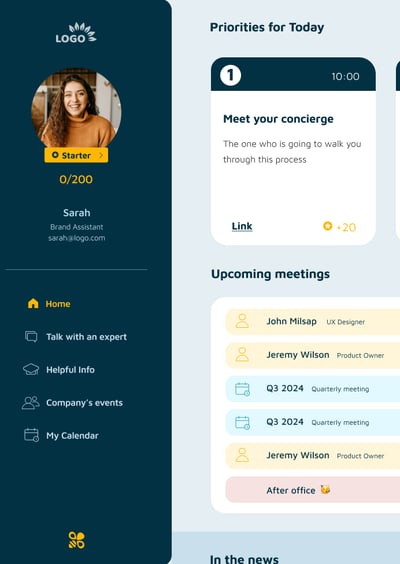

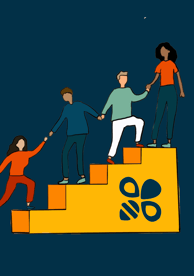

After COVID-19, remote work is here to stay. In fact, a flexible working arrangement has become the third-most popular reason cited when looking for a new job (McKinsey & Co). But While many appreciate the absence of commute and ease of working from home, others struggle with decreased human contact and mobility, Zoom fatigue, and recreating physical workflow digitally. Together with my colleagues, we asked ourselves:
About the project
How might we create improvements to set remote work up to succeed in the long-term in a way that addresses some of the most pressing issues for employees and organizational leadership?
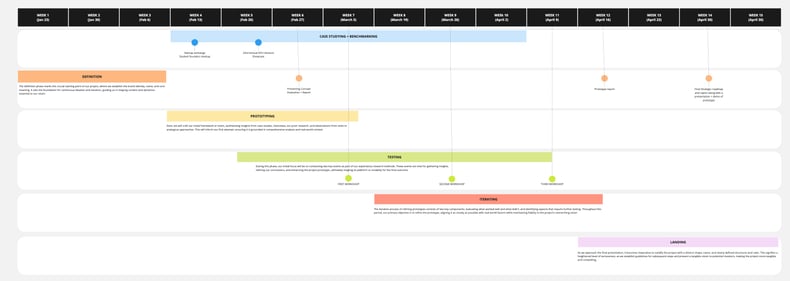

Team Roadmap and milestones
Research overview
After conducting, analyzing, and clustering all the information collected through primary and secondary research, we map and organize what we know about our target audience, and discovered 3 main pain points.
Interview questions included:
How has your company embraced remote working?
Could you tell us what a typical work day is like from the moment you wake up?
Can you tell me about how your team dynamics changed when you went remote/virtual? What changes have you experienced in how frequently you communicate with your team?
Tell me about a time when you had a complicated experience during virtual working
What is your first impression or feeling when you think of online work
12 Interviews
76 Survey responses
+12 Articles
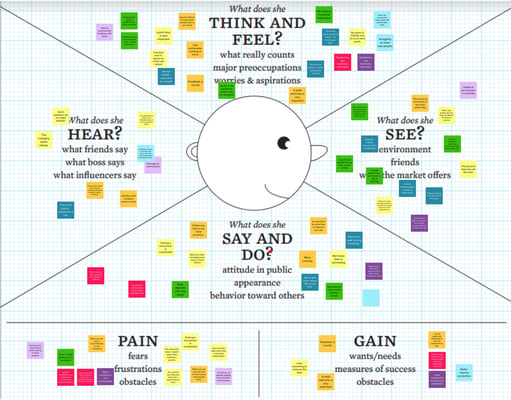

Affinity mapping
Key Insights
Building Social Capital
There is NO informal interaction of remote teams, everything is intentional because they are not in the same physical space.
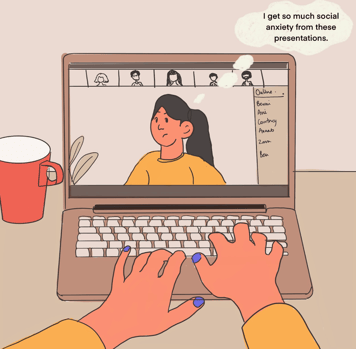

Write a short text about your service. Highlight key benefits for potential clients.
Service title
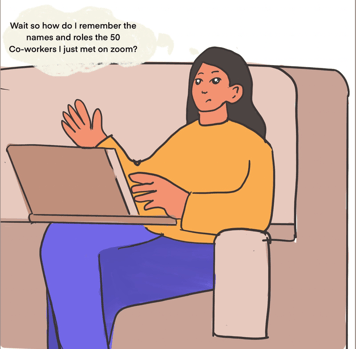

Steep Learning Curve
For new employees, understanding and feeling like a part of the culture is difficult when there is no information or spontaneous interaction time
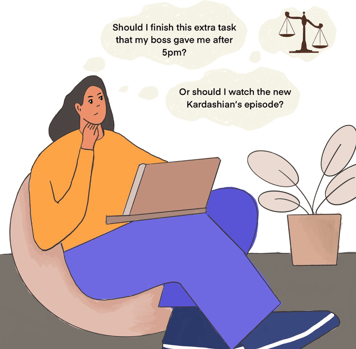

Work-life balance
Young professionals are not comfortable having so much autonomy over their schedule working remote, because they don’t have experience managing their own time.
Making sense...
We utilized the findings to identify our main target audience and map out the user journey. This process highlighted the primary pain points, behaviors, and gaps in the experience of a young professional joining a new company in an online setting.




User Persona
Journey mapping
Ideating & testing
After synthesizing and extracting insights from our research, the ideation and design phase commenced. We conducted two rounds of concept testing followed by two rounds of UX testing, aligning with three core pillars identified in our research:
1) Techniques to build social capital online 2) Facilitating a thoughtful networking plan for new hires 3) Helping new employees to learn time management and work-life balance
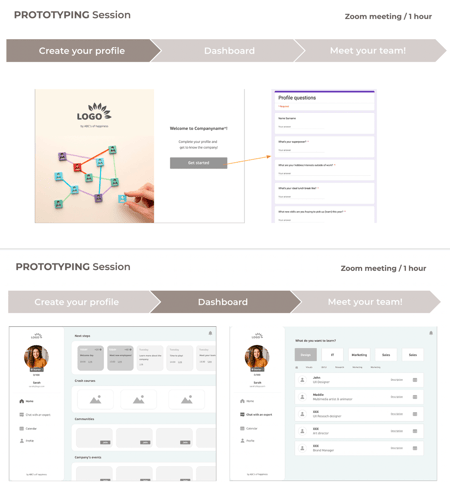

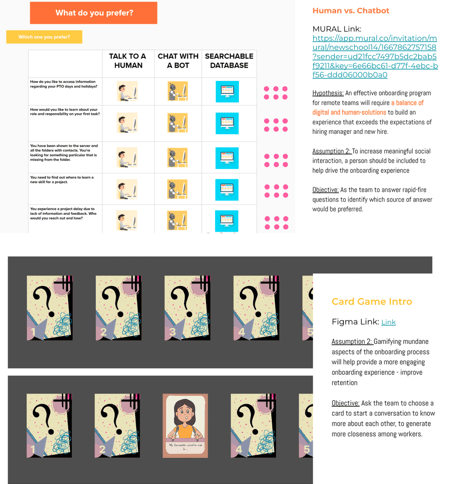

Initially, we utilized basic tools such as Mural and Zoom to test our concept's hypothesis in online sessions facilitated with key stakeholders. The goal was to analyze their reactions, feelings, and behaviors, employing techniques to build social capital within a group of 'strangers.'
Subsequently, we developed the first version of our service and conducted a second round of usability testing, this time utilizing an interactive prototype with Figma. This iteration resulted in valuable feedback and identified key behaviors, prompting adjustments to our solution and contributing to the development of the initial version of our proposal.
Building the solution
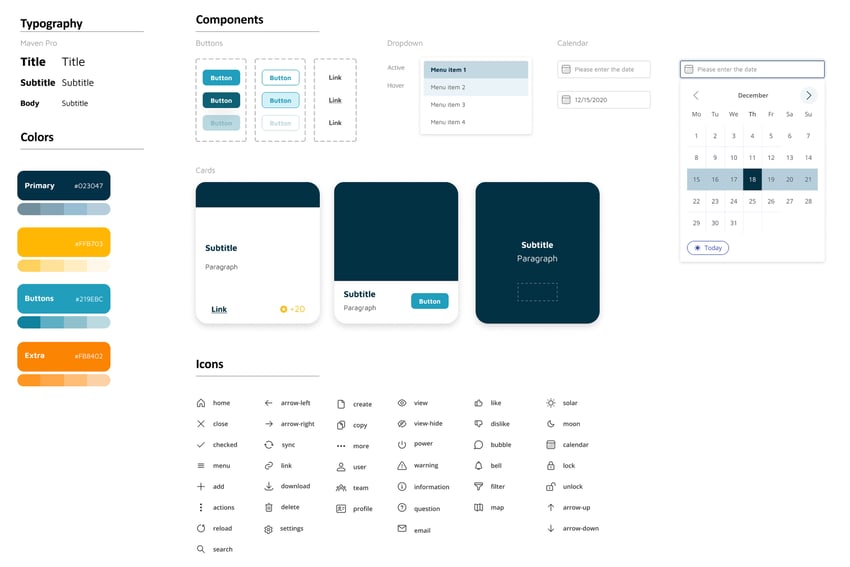

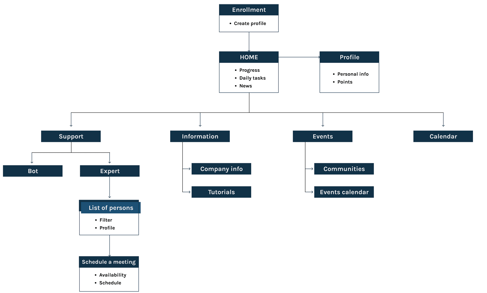

Design System (UI KIT)
To maintain consistency and efficiency, I created a lightweight design system with essential components—typography, colors, buttons, and spacing rules. This served as a practical foundation for the team, ensuring a cohesive look and feel without slowing down the design process.
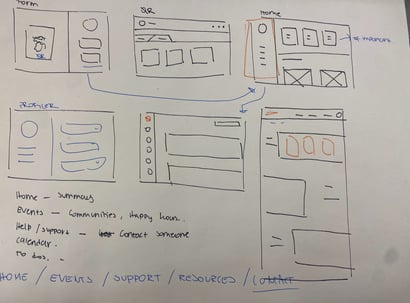

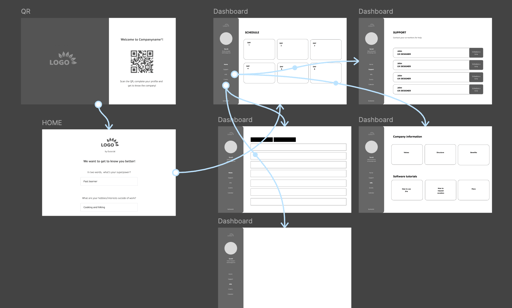

Defining the System & Its Flow
With the structure in place, I outlined the product’s framework through information architecture, wireframes, and wireflows. These elements defined the user journey and interactions, aligning functionality with design before moving into high-fidelity execution

Meet EUSOCIAL …
For Midsized (50 to 1,000 employees) to Large (1,000+) companies, Eusocial is the onboarding platform that brings a personalized, concierge approach to new employees with a focus on building and improving a socially connected culture.
Key takeaways
1. A constant reminder that a thorough, in-depth research process is the foundation that makes subsequent steps and decision-making smoother and more efficient.
2. While researching and designing solutions for problems we've personally faced can fuel our drive, it's crucial to remain mindful of biases. We must differentiate our personal experiences from the insights gained through research to ensure the solution is unbiased and effective.


